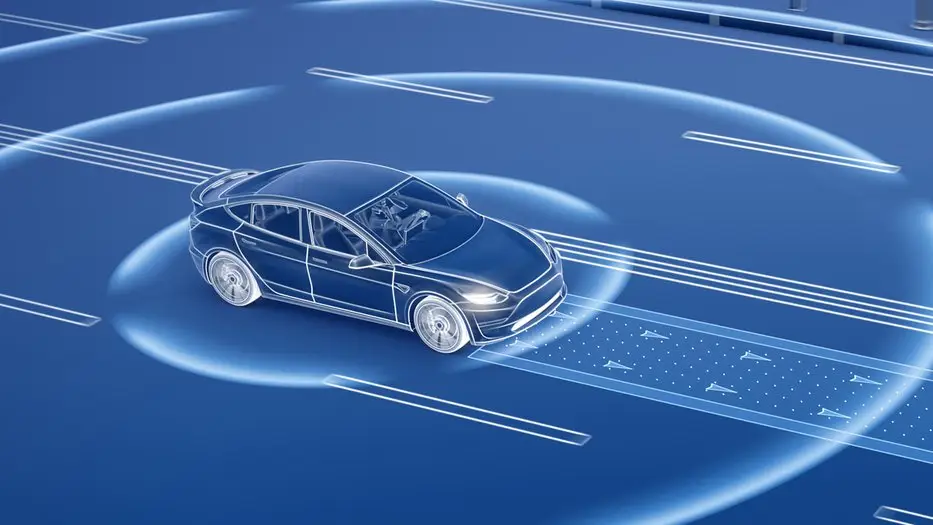“The auto industry is shifting gears. AI is accelerating innovation, disrupting traditional models, and driving growth. The industry’s transformation is gaining speed with autonomous vehicles, smart factories, and data-driven design. Get ready to explore cutting-edge technologies and trends reshaping mobility’s future. Let’s dive in!”AI AUTO
From basic automation to advanced AI applications
The auto industry’s AI journey has accelerated rapidly, transforming from basic automation to sophisticated applications that redefine the manufacturing and driving experiences. AI’s impact is evident in every stage, from design to production, and even in the cars we drive daily.AI AUTO
GM’s AI-powered predictive maintenance ensures machines run smoothly, minimizing downtime and maximizing efficiency. Meanwhile, Tesla’s Autopilot leverages AI to enhance safety and autonomy, with vehicles learning from each other’s experiences.AI AUTO
Meet Rahul, a tech-savvy driver who appreciates how his AI-infused vehicle adapts to his preferences, simplifying his daily commute. “AI makes my drive smarter, safer, and more enjoyable,” he says.AI AUTO
As AI continues to advance, the industry is poised for even more transformative innovations, revolutionizing the way cars are built, driven, and experienced.AI AUTO
Autonomous driving, predictive maintenance, personalized experiences
AI is revolutionizing the auto industry in three significant ways: autonomous driving, predictive maintenance, and personalized experiences. These innovations are transforming the way we interact with vehicles, making our lives easier, safer, and more enjoyable.
Autonomous driving:
Imagine a world where cars drive themselves, reducing accidents and traffic congestion. Waymo, a pioneer in autonomous technology, has already logged over 20 million miles on public roads, ensuring a safer and more efficient transportation system.
Predictive maintenance:
AI-powered sensors detect potential issues before they become major problems, reducing downtime and repair costs. Toyota uses AI to predict maintenance needs, ensuring their vehicles run smoothly and efficiently.
Personalized experiences:
AI learns our preferences, tailoring our driving experiences to our individual needs. BMW’s AI-powered voice assistant adjusts temperature, music, and navigation settings, making every drive feel personalized.
Meet Emily, a busy professional who appreciates her AI-powered vehicle’s personalized features. “My car knows my favorite routes, music, and temperature settings, making my daily commute feel tailored to my needs.”
These AI applications are not just technological advancements; they’re improving lives, saving time, and enhancing our overall driving experiences.
Machine learning, computer vision, NLP: The AI trifecta
The auto industry’s AI transformation relies on three powerful technologies: machine learning, computer vision, and natural language processing (NLP). Together, they enable vehicles to learn, perceive, and understand their surroundings, revolutionizing the driving experience.AI AUTO
Machine learning:
Vehicles learn from data, adapting to new situations and improving performance. Tesla’s Autopilot system uses machine learning to refine its autonomous driving capabilities, setting a new standard for safety and efficiency.AI AUTO
Computer vision:
Vehicles “see” and interpret their surroundings, detecting obstacles and navigating complex environments. Volvo’s City Safety system uses computer vision to detect pedestrians, cyclists, and vehicles, reducing accidents and saving lives.AI AUTO
NLP:
Vehicles understand voice commands, enabling drivers to interact naturally. Mercedes-Benz’s MBUX system uses NLP to understand voice commands, providing a personalized driving experience.AI AUTO
Meet Sarah, a driver who appreciates the convenience and safety of these technologies. “I can rely on my car to alert me to potential hazards, understand my voice commands, and adapt to my driving style. It’s like having a personal driving assistant!”
These technologies are not just innovative; they’re transforming the auto industry and improving lives.
Improved safety, efficiency, and customer experience:
The auto industry’s AI revolution is driving significant improvements in safety, efficiency, and customer experience, transforming the way we drive and interact with our vehicles.AI AUTO
Safer roads:
AI-powered vehicles detect and respond to hazards faster than human drivers, reducing accidents and saving lives. Volvo’s AI-powered collision avoidance system is a testament to this, with a proven track record of preventing accidents.AI AUTO
Optimized performance:
AI optimizes engine performance, reducing fuel consumption and emissions, and making our drives more efficient and eco-friendly. Tesla’s AI-powered engine management system is a prime example, adjusting performance in real-time for maximum efficiency.AI AUTO
Personalized driving experiences:
AI learns our preferences, adapting the driving experience to our individual needs. BMW’s AI-powered infotainment system tailors music, navigation, and temperature settings to our liking, making every drive feel personalized.AI AUTO
Meet Maria, a driver who appreciates the improved efficiency and safety features in her AI-powered vehicle. “My car’s AI system alerts me to potential hazards and optimizes fuel efficiency, making my daily commute safer and more enjoyable. It’s like having a personal driving assistant!”AI AUTO
AI is transforming the auto industry, making our drives safer, more efficient, and more enjoyable. The future of driving is here, and it’s powered by AI.
Data privacy, security, ethical concerns: Navigating the AI landscape
As AI revolutionizes the auto industry, concerns around data privacy, security, and ethics have become paramount. The use of personal data and surveillance capabilities raises important questions about trust, consent, and responsibility.AI AUTO
Protecting personal data:
Vehicles collect sensitive information, including location data, driving habits, and personal preferences. General Motors’ data protection policies prioritize transparency and user control, setting a high standard for the industry.
Securing connected vehicles:
Cyber attacks on connected vehicles can have serious consequences. Toyota’s robust security measures include regular software updates and penetration testing, ensuring the safety of drivers and passengers.AI AUTO
Ethical AI development:
AI systems must be designed with fairness and accountability in mind. The development of diverse and inclusive AI teams is crucial for creating systems that serve everyone equally.
Meet Jamal, a driver who values his data privacy. “I want to trust that my vehicle’s AI system is protecting my personal data and prioritizing my safety. I expect the industry to prioritize transparency and accountability.”AI AUTO
By addressing these concerns, the auto industry can build trust with drivers, ensure the safe development and deployment of AI, and create a future where AI enhances our driving experiences without compromising our values.AI AUTO
AI-powered vehicles, smart mobility, edge computing: Redefining transportation
The synergy of AI, smart mobility, and edge computing is reshaping the auto industry, creating a new generation of intelligent vehicles that are transforming the way we travel.AI AUTO
AI-powered vehicles:
Cars are becoming intelligent entities that learn and adapt, enhancing safety and driver experience. Waymo’s self-driving taxis use AI to navigate complex routes and ensure passenger safety.AI AUTO
Smart mobility:
AI optimizes traffic flow, reducing congestion and emissions, and making our cities more livable. London’s Smart Traffic Management system uses AI to optimize traffic light timing, reducing travel times by 20%.AI AUTO
Edge computing:
Real-time processing enables instant decision-making, improving safety and performance. NVIDIA’s edge computing platform powers AI-enabled vehicles, enabling faster processing and improved safety features.AI AUTO
Meet Samantha, a daily commuter who appreciates the convenience of AI-powered transportation. “I rely on AI-enabled public transport to get me to work on time. It’s amazing to see how technology is making our lives easier!”AI AUTO
This technological convergence is revolutionizing transportation, making it more efficient, sustainable, and enjoyable. As innovation continues, we can expect even more exciting developments that will transform the way we travel.
Potential for increased autonomy, electrification, connectivity: Redefining the driving experience
The auto industry is undergoing a significant transformation, driven by AI, electrification, and connectivity. These technologies are converging to create a new generation of vehicles that are safer, more sustainable, and more connected.
Autonomy:
Vehicles are becoming increasingly autonomous, enabled by AI and sensor technologies. Cruise’s self-driving cars are navigating complex city streets, paving the way for a future without accidents.
Electrification:
Electric vehicles are gaining traction, offering a cleaner and more efficient alternative to traditional gasoline-powered cars. Lucid Motors’ electric cars boast impressive range and performance, making sustainable driving a reality.
Job market evolution:
AI is creating new opportunities, transforming traditional roles, and demanding novel skill sets. General Motors’ AI team is hiring experts in machine learning and data science to develop next-generation vehicle systems.
Innovative business models:
AI is enabling disruptive services, data-driven revenue streams, and creative partnerships. BMW’s AI-powered mobility services are redefining urban transportation, integrating vehicles, public transit, and smart infrastructure.
Ethical imperatives:
AI raises crucial concerns about bias, privacy, transparency, and accountability. The AI Alliance is promoting responsible AI development, ensuring that AI systems prioritize human safety, security, and well-being.
Meet Sophia, a data scientist driving AI innovation in the auto industry. “I’m passionate about developing AI systems that enhance vehicle safety, driver experience, and sustainability. It’s a privilege to contribute to this transformative journey!”
This transformation demands a workforce that’s agile, creative, and ethical. As AI continues to reshape the auto industry, we must prioritize responsible AI development, deployment, and use.
AI's profound impact on the automotive industry's future: Revolutionizing the road ahead
The automotive industry is on the cusp of a revolution, driven by AI’s transformative power. From design to driving, AI is reshaping the industry’s future, promising unprecedented innovation, efficiency, and safety.
Smarter design and development:
AI is unlocking new possibilities in vehicle design, engineering, and manufacturing. Volvo’s AI-powered design studio is creating cutting-edge vehicles that combine style, sustainability, and safety.
Autonomous driving revolution:
AI is driving the development of self-driving cars, promising to transform transportation and mobility. Cruise’s AI-powered autonomous vehicles are already navigating complex city streets, paving the way for a safer, more efficient future.
Personalized driving experiences:
AI is enabling vehicles to learn and adapt to driver preferences, providing tailored driving experiences. Mercedes-Benz’s AI-powered MBUX system is setting a new standard for driver convenience, safety, and enjoyment.
Meet Leila, a young driver excited about AI’s impact on the industry. “I’m thrilled to see how AI is transforming the driving experience, making it safer, more enjoyable, and more sustainable. The future of transportation has never looked brighter!”
AI is transforming the automotive industry, enabling a new era of innovation, efficiency, and safety. As the industry continues to evolve, we can expect even more exciting developments that will shape the future of transportation.

